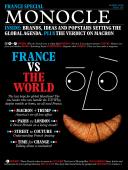
Issue 121
France vs the world. The last hope for global liberalism? The one leader who can handle the US? Why, despite trouble at home, we all need France.
In This Issue
Oops! No content was found.
Looks like we no longer have content for the page you're on. Perhaps try a search?
Return Home

